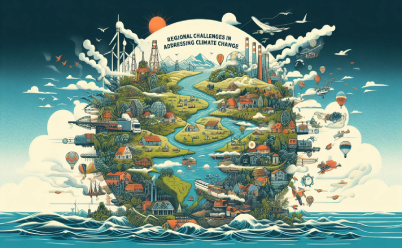About This Course
This course provides an in-depth examination of the unique challenges and opportunities faced by different regions in addressing the impacts of climate change. Participants will explore regional disparities in climate change impacts, adaptation strategies, and mitigation efforts. Key topics covered in this course include:
- Regional Climate Change Impacts: : Gain insights into the specific climate change impacts affecting different regions, including changes in temperature, precipitation patterns, sea level rise, extreme weather events, and their implications for ecosystems, economies, and societies.
- Vulnerability Assessment: : Learn about methods for assessing the vulnerability of different regions to climate change, considering factors such as exposure, sensitivity, adaptive capacity, and socio-economic disparities.
- Adaptation Strategies: : Explore adaptation strategies tailored to the specific challenges faced by different regions, including water management, agricultural practices, coastal protection, urban planning, and infrastructure resilience.
- Mitigation Efforts: : Examine mitigation efforts implemented at the regional level, including renewable energy deployment, energy efficiency measures, land-use planning, carbon pricing, and emission reduction targets.
- Policy and Governance: : Discuss the role of regional policies and governance frameworks in addressing climate change, including international agreements, national strategies, sub-national initiatives, and multi-stakeholder collaborations.
- Community Engagement: : Learn about the importance of community engagement and grassroots movements in driving climate action at the regional level, fostering local resilience, and promoting sustainable practices.
- Case Studies and Best Practices: : Through case studies from different regions around the world, participants will gain insights into successful regional initiatives, innovative approaches, and lessons learned in addressing climate change challenges.
Through interactive discussions, group exercises, and case studies, participants will develop a nuanced understanding of the regional challenges in addressing climate change and explore effective strategies for building resilience and promoting sustainability at the regional level.






Drop us a line for More Details